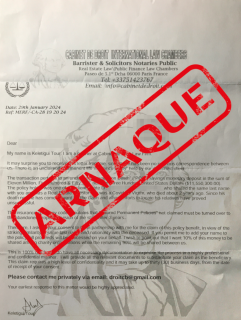
Although scams of this kind are generally sent by post and email, attempts via text message and social media or instant messaging services have increased in recent years.
Typically, the goal of scammers is to generate interest in the victim by offering large profits or investments, with the aim of obtaining their personal information or money.
- Inheritances or donations
In these cases, there is often talk of processing fees or initial investments that need be paid into an account before the promised sum can be claimed. Of course, the victim will never see either the initial investment or the promised winnings.
- Fake lottery winnings, prize competitions, etc.
The perpetrators send the victim a link or an email containing a form to fill out in order to claim their winnings or participate in a prize competition. By submitting their personal data via the form, the victim unwittingly gives the scammer all the information they need to access their personal accounts.
Preventive tips:
- Be wary of easy money and advertisements that seem too good to be true.
- Always think carefully if you have actually entered a competition or lottery, even if the prospect of winning a large sum of money seems appealing.
- Be suspicious of messages from people or companies you do not know.
- Be also suspicious of messages from people you know inviting you to participate in prize competitions, as their email or instant messaging account may have been hacked.
- Be wary of suspicious email addresses that do not match the company or organisation indicated.
- If necessary, check whether the company or organisation mentioned actually exists and whether it has published any information (on its official pages, websites or social media accounts, etc.) about the said competition.
- Misspellings and mistranslation errors, multiple languages in the same letter, text formatting errors and email addresses from free email services can be signs of a scam attempt.
- Never share personal and sensitive data by email, instant messaging services or telephone.












